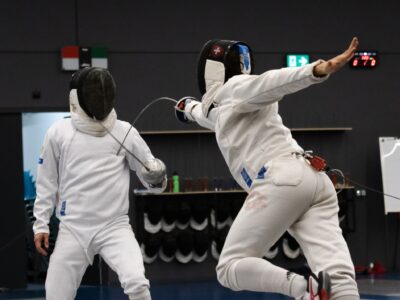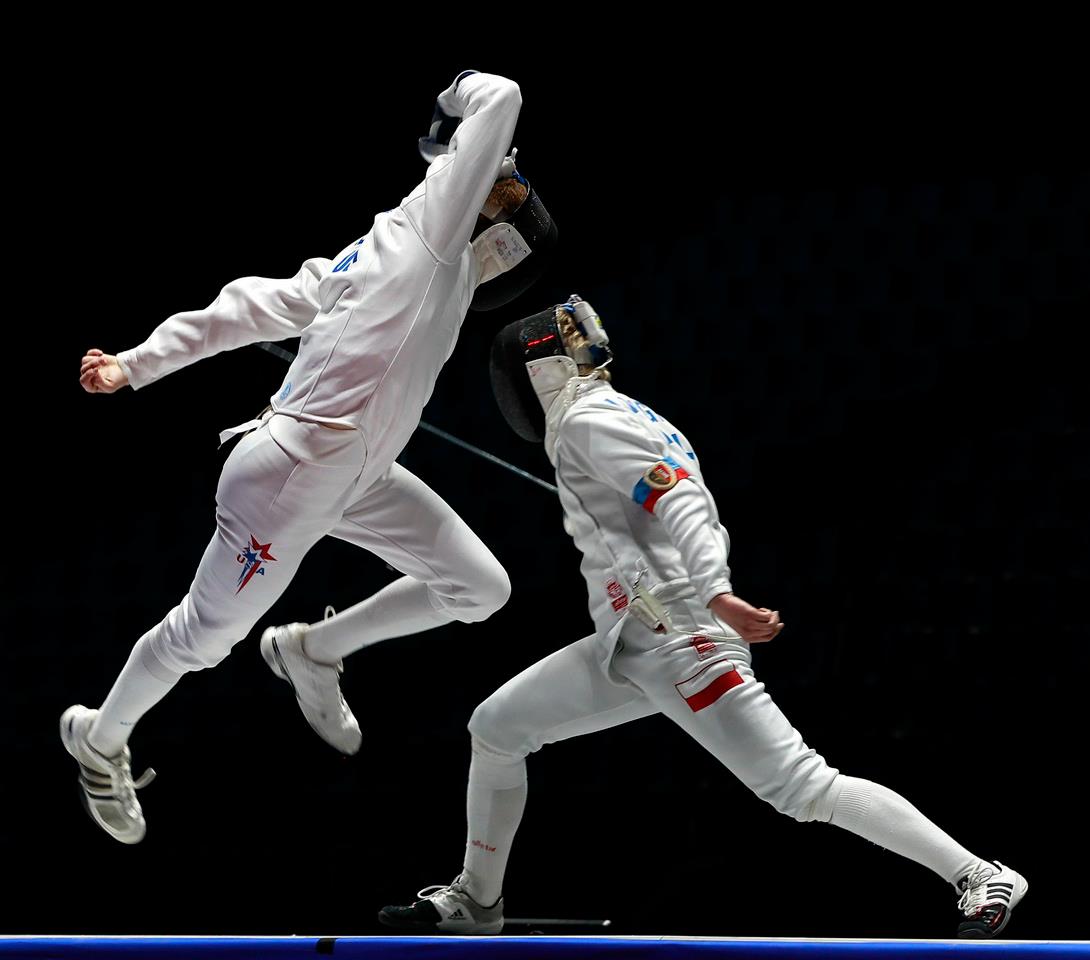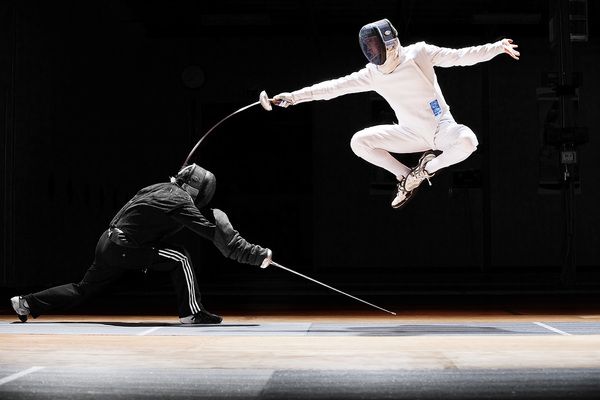Fencing is a sport that requires both physical and mental agility. It involves using a sword to score points against an opponent by making contact with their body. While it may seem like a simple concept, there are many techniques and strategies involved in becoming a successful fencer. In this blog post, we will discuss some essential fencing tips for beginners, mastering the basics of fencing, common mistakes to avoid, improving footwork, strategies for winning matches, choosing the right equipment, mental preparation for competitions, staying safe while fencing, training exercises, and advanced techniques for success.
Fencing Tips for Beginners

If you are new to fencing, it can be overwhelming to learn all the rules and techniques. However, with dedication and practice, anyone can become a skilled fencer. Here are some tips for beginners to get started:
1. Find a Good Coach
The first step in learning any sport is finding a good coach. A qualified coach will not only teach you the proper techniques but also help you develop your skills and improve your overall performance. They will also guide you in selecting the right equipment and provide valuable feedback to help you progress.
2. Learn the Rules
Before you start fencing, it is crucial to familiarize yourself with the rules of the sport. This will not only help you understand the game but also prevent you from making mistakes during a match. You can find the official rules of fencing on the website of the International Fencing Federation (FIE).
3. Start with the Right Equipment
To begin fencing, you will need a mask, jacket, glove, and sword. It is essential to invest in high-quality equipment as it will not only last longer but also provide better protection. Your coach can guide you in selecting the right gear based on your height, weight, and dominant hand.
4. Practice Footwork
Footwork is a crucial aspect of fencing as it allows you to move quickly and efficiently on the strip. As a beginner, you should focus on developing proper footwork techniques such as lunges, retreats, and advances. These movements will help you maintain balance and control during a match.
5. Be Patient and Persistent
Fencing is a challenging sport, and it takes time to master the techniques. It is essential to be patient and persistent in your training. Don’t get discouraged if you don’t see immediate results. With consistent practice and dedication, you will gradually improve and become a skilled fencer.
Mastering the Basics of Fencing

Once you have learned the basics of fencing, it is time to focus on mastering them. Here are some tips to help you become proficient in the fundamentals of fencing:
1. Perfect Your Stance
Your stance is the foundation of your fencing technique. It is essential to maintain a balanced and stable stance to execute attacks and defend against your opponent’s attacks. Keep your feet shoulder-width apart, with your dominant foot slightly ahead of the other. Your knees should be slightly bent, and your weight evenly distributed.
2. Work on Your Grip
The way you hold your sword can greatly impact your performance in fencing. The grip should be firm but not too tight, allowing for flexibility and movement. Your thumb should be placed on the back of the handle, and your index finger should be wrapped around the guard. Practice gripping your sword correctly to develop muscle memory.
3. Focus on Timing and Distance
Timing and distance are crucial in fencing. You must learn to anticipate your opponent’s moves and react accordingly. This requires good footwork and an understanding of the appropriate distance to attack or defend. Practice with a partner to improve your timing and distance skills.
4. Learn Different Attacks and Parries
There are various types of attacks and parries in fencing, each with its own purpose and technique. It is essential to learn and practice these techniques to become a well-rounded fencer. Some common attacks include the lunge, fleche, and disengage, while common parries include the circular parry, octave parry, and counter-parry.
5. Watch and Learn from Experienced Fencers
One of the best ways to master the basics of fencing is by watching and learning from experienced fencers. Attend local competitions or watch videos of professional fencers to observe their techniques and strategies. You can also ask your coach for tips on how to improve specific aspects of your fencing.
Common Mistakes to Avoid in Fencing

As with any sport, there are common mistakes that beginners tend to make in fencing. Being aware of these mistakes can help you avoid them and improve your performance. Here are some common mistakes to watch out for:
1. Overextending Your Arm
Many beginners tend to overextend their arm when making an attack. This not only makes it easier for your opponent to parry but also puts you off balance. Instead, focus on keeping your arm slightly bent and using your wrist to make quick and precise movements.
2. Not Using Your Non-Dominant Hand
Your non-dominant hand plays an important role in fencing. It helps with balance and control, and can also be used to deceive your opponent. Make sure to keep your non-dominant hand close to your body and use it to assist in your movements.
3. Lack of Footwork
Footwork is crucial in fencing, and many beginners tend to neglect it. Without proper footwork, it becomes challenging to execute attacks and defend against your opponent’s attacks. Make sure to practice footwork drills regularly to improve your agility and coordination.
4. Not Focusing on Defense
While it may be tempting to focus solely on attacking, defense is just as important in fencing. Neglecting your defense can leave you vulnerable to your opponent’s attacks and result in losing points. Make sure to practice parries and incorporate them into your training.
5. Not Adapting to Your Opponent’s Style
Every fencer has their own unique style and techniques. It is essential to observe and adapt to your opponent’s style during a match. This will not only help you anticipate their moves but also give you an advantage in scoring points.
Improving Your Footwork in Fencing
As mentioned earlier, footwork is a crucial aspect of fencing. It allows you to move quickly and efficiently on the strip, making it easier to execute attacks and defend against your opponent’s attacks. Here are some tips to improve your footwork in fencing:
1. Practice Lunges and Retreats
Lunges and retreats are two fundamental footwork techniques in fencing. They require coordination and balance, which can be improved through regular practice. Start by practicing lunges and retreats without a sword, and gradually add the sword to your movements.
2. Incorporate Footwork Drills into Your Training
There are various footwork drills that you can incorporate into your training to improve your agility and coordination. Some examples include the box drill, ladder drill, and mirror drill. These drills will not only improve your footwork but also help you develop muscle memory.
3. Work on Your Speed and Precision
In fencing, speed and precision are key. You must be able to move quickly and precisely to score points against your opponent. To improve your speed, focus on shortening your steps and maintaining a low center of gravity. For precision, practice making small, controlled movements with your feet.
4. Train Both Sides Equally
In fencing, you must be able to attack and defend from both sides. This requires training both your dominant and non-dominant sides equally. Make sure to practice footwork drills and techniques on both sides to improve your overall performance.
5. Use Resistance Training
Resistance training can help improve your footwork in fencing. You can use resistance bands or a partner to add resistance to your movements, making them more challenging. This will not only improve your strength but also help you develop explosive movements.
Strategies for Winning Fencing Matches
Fencing is not just about physical strength and technique; it also requires strategic thinking. Here are some strategies that can help you win fencing matches:
1. Study Your Opponent
Before a match, take the time to study your opponent’s style and techniques. This will give you an idea of what to expect during the match and help you come up with a game plan. You can also watch videos of their previous matches to observe their strengths and weaknesses.
2. Be Aggressive
In fencing, being aggressive can give you an advantage over your opponent. It puts pressure on them and forces them to react, giving you the opportunity to score points. However, make sure not to be too aggressive and leave yourself open to counterattacks.
3. Mix Up Your Attacks
Repeating the same attack over and over again makes it easier for your opponent to anticipate and defend against it. Instead, mix up your attacks by using different techniques and angles. This will keep your opponent guessing and make it harder for them to defend.
4. Stay Calm and Focused
Fencing can be a fast-paced and intense sport, but it is crucial to stay calm and focused during a match. Losing your cool can lead to making mistakes and losing points. Take deep breaths and focus on your game plan to stay composed.
5. Be Confident
Confidence is key in fencing. Believe in your abilities and trust in your training. This will not only help you perform better but also intimidate your opponent. However, make sure not to be overconfident and underestimate your opponent.
Choosing the Right Fencing Equipment
Having the right equipment is essential for success in fencing. Here are some factors to consider when choosing fencing equipment:
1. Quality
Investing in high-quality equipment is crucial for safety and performance. Make sure to purchase equipment from reputable brands and check for any defects before making a purchase.
2. Fit
Fencing equipment should fit comfortably and provide adequate protection. Your mask should fit snugly without obstructing your vision, and your jacket should allow for a full range of motion. It is recommended to try on equipment before purchasing to ensure a proper fit.
3. Material
Fencing equipment is typically made of durable materials such as cotton, nylon, and steel. Make sure to choose equipment that is both comfortable and durable to withstand the rigors of fencing.
4. Weight
The weight of your equipment can greatly impact your performance in fencing. Make sure to choose equipment that is lightweight and does not hinder your movements.
5. Cost
While it is important to invest in quality equipment, it is also essential to consider your budget. Look for deals and discounts, and compare prices from different brands to find the best value for your money.
Mental Preparation for Fencing Competitions
In addition to physical training, mental preparation is also crucial for success in fencing competitions. Here are some tips to help you prepare mentally:
1. Visualize Success
Visualization is a powerful tool for athletes. Before a competition, take some time to visualize yourself performing well and winning. This will help boost your confidence and prepare you mentally for the competition.
2. Practice Breathing Techniques
Deep breathing can help calm nerves and reduce anxiety before a competition. Practice deep breathing techniques to help you stay calm and focused during a match.
3. Set Realistic Goals
Setting realistic goals for yourself can help motivate you and give you something to strive for. Make sure to set achievable goals that will push you to improve but not overwhelm you.
4. Stay Positive
Fencing, like any sport, has its ups and downs. It is essential to stay positive and not let setbacks affect your performance. Instead, use them as learning opportunities and focus on improving for the next competition.
5. Have Fun
Lastly, remember to have fun! Fencing is a challenging but enjoyable sport. Don’t let the pressure of competition take away from the joy of the sport. Enjoy the experience and use it as motivation to continue improving.
Staying Safe While Fencing
As with any sport, safety should be a top priority in fencing. Here are some tips to help you stay safe while fencing:
1. Wear Protective Gear
Wearing proper protective gear is crucial in fencing. Make sure to wear a mask, jacket, glove, and appropriate footwear to prevent injuries.
2. Check Equipment Before Use
Before using your equipment, make sure to check for any defects or damages. This includes checking the wires on your sword and ensuring they are not frayed or broken.
3. Warm-Up and Stretch
Warming up and stretching before a match can help prevent injuries. Make sure to include exercises that target the muscles used in fencing, such as lunges and footwork drills.
4. Listen to Your Body
If you feel any pain or discomfort while fencing, stop immediately and assess the situation. Pushing through injuries can lead to more severe injuries and hinder your progress.
5. Follow Safety Rules
Make sure to follow all safety rules and regulations set by your coach or competition officials. This includes using proper techniques and avoiding dangerous moves that can cause harm to yourself or your opponent.
Training Exercises for Fencers
To become a successful fencer, it is essential to have a well-rounded training routine. Here are some exercises that can help improve your fencing skills:
1. Cardiovascular Exercises
Fencing requires a lot of stamina and endurance. Incorporate cardiovascular exercises such as running, cycling, or swimming into your training routine to improve your overall fitness.
2. Strength Training
Strength training is crucial in fencing as it helps with explosive movements and prevents injuries. Focus on exercises that target the muscles used in fencing, such as lunges, squats, and shoulder presses.
3. Plyometric Exercises
Plyometric exercises involve explosive movements that can help improve your speed and agility. Some examples include box jumps, burpees, and lateral hops.
4. Coordination Drills
Coordination drills can help improve your footwork and hand-eye coordination. Some examples include ladder drills, cone drills, and mirror drills.
5. Stretching and Flexibility Exercises
Flexibility is essential in fencing as it allows for a full range of motion and prevents injuries. Make sure to incorporate stretching exercises into your training routine to improve your flexibility.
Advanced Techniques for Fencing Success
As you progress in fencing, you may want to learn more advanced techniques to take your skills to the next level. Here are some advanced techniques that can help you achieve success in fencing:
1. Compound Attacks
Compound attacks involve combining multiple attacks to confuse and deceive your opponent. These attacks require quick footwork and precise movements.
2. Counterattacks
Counterattacks involve attacking your opponent while they are making an attack. This technique requires good timing and coordination.
3. Feints
Feints involve making a fake attack to deceive your opponent and create an opening for a real attack. This technique requires good footwork and coordination.
4. Disengages
Disengages involve changing the direction of your sword mid-attack to avoid your opponent’s parry. This technique requires quick reflexes and precise movements.
5. Fleches
Fleches are explosive attacks where you launch yourself towards your opponent while making an attack. This technique requires good timing and coordination.
Conclusion
Fencing is a challenging but rewarding sport that requires dedication, practice, and mental fortitude. By following these fencing tips for beginners, mastering the basics, avoiding common mistakes, improving footwork, using strategies for winning matches, choosing the right equipment, preparing mentally, staying safe, and incorporating training exercises and advanced techniques, anyone can become a successful fencer. Remember to always have fun and enjoy the journey of becoming a skilled fencer.